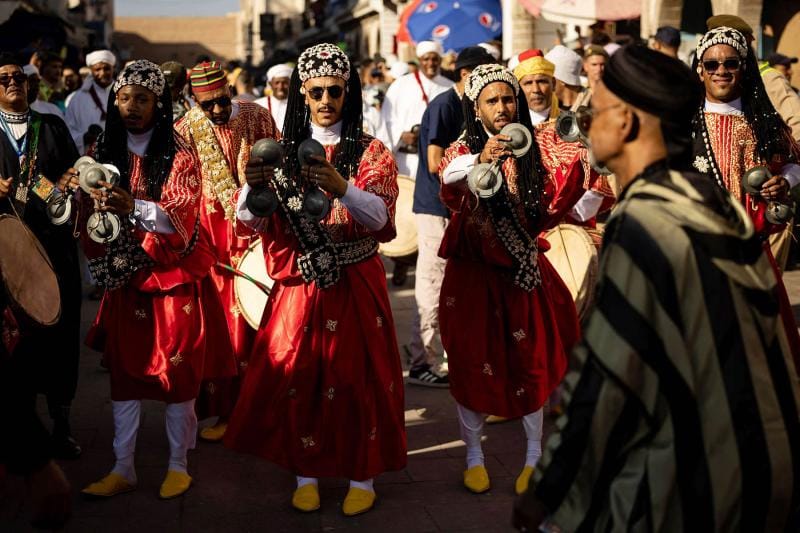From June 19 to 21, the Atlantic port city of Essaouira will transform into a vibrant hub of rhythm and culture as it hosts the 26th edition of the Gnaoua and World Music Festival. Known for its deep-rooted musical traditions and cosmopolitan atmosphere, the city will welcome an eclectic lineup of global artists for three days of performances, dialogue, and cultural exploration.
This year’s festival brings together 350 artists, including 40 revered Maalems (Gnaoua master musicians), across 54 performances staged throughout the city. From sprawling open-air squares and centuries-old heritage sites to intimate, enclosed venues, the concerts are designed to create a unique atmosphere that blends Essaouira’s historic charm with modern musical innovation.
Described by organizers as “more than just a celebration,” the event has evolved into a cultural movement—one that not only celebrates music but also encourages spiritual expression and intercultural exchange. Essaouira becomes, for a few days, a global meeting point where borders blur and sound connects people from all walks of life.
The festivities will kick off with a dynamic street parade, gathering all the Maalems for a spirited procession through the city. This visual and auditory spectacle sets the tone for what’s to come: a convergence of tradition and transformation.
The opening concert, held on the iconic Moulay Hassan stage, will showcase the powerful collaboration between Maalem Hamid El Kasri and Senegal’s Bakalama Company. Together with Moroccan vocalist Abir El Abed and Senegalese singer Kya Loum, the ensemble promises an emotionally rich performance that fuses Moroccan spiritual music with West African rhythms and contemporary influences.
Over the course of the festival, audiences can expect rare and meaningful cross-cultural collaborations. One notable performance will feature Maalem Houssam Gania alongside acclaimed American drummer Marcus Gilmore, uniting the deep-rooted pulse of Gnaoua with the improvisational energy of New York jazz. Another standout moment includes Morad El Marjan entering into a spiritual musical dialogue with celebrated Tunisian jazz artist Dhafer Youssef. Meanwhile, Asmaa Hamzaoui and her all-female group Bnat Timbouktou will take the stage with Malian vocalist Rokia Koné, creating a powerful narrative of feminine artistry and pan-African solidarity.
A particularly anticipated highlight will be a new collaborative creation by Maalem Mohamed Boumezzough, featuring a diverse ensemble of musicians from Morocco, Mali, and France—offering a bold reinterpretation of traditional Gnaoua expressions through a multicultural lens.
Beyond Gnaoua, the festival also brings in big names from the broader African and Afro-diasporic music scenes. Afro-Cuban funk star Cimafunk, Ivorian reggae legend Tiken Jah Fakoly, and Nigerian Afropop sensation CKay are among the headline acts, adding variety and depth to the program while reinforcing the event’s global character.
Rising Gnaoua talents will also have their moment in the spotlight. Performing on the beach stage, these younger artists will share the platform with seasoned masters, emphasizing the festival’s commitment to nurturing the next generation of musical leaders.
But the Gnaoua and World Music Festival isn’t just about performances—it’s also a forum for thought, reflection, and education. The Human Rights Forum, an integral part of the festival, returns with a timely theme: human mobility and cultural exchange. Through public talks and panel discussions, artists, historians, writers, and intellectuals such as Andrea Rea, Elia Suleiman, and Véronique Tadjo will explore topics ranging from migration and diaspora to identity and cultural memory.
The educational component of the festival continues to grow, thanks to the Berklee at Gnaoua initiative. In partnership with the prestigious Berklee College of Music, the program will offer workshops and masterclasses for young musicians representing 23 different countries. Led by internationally renowned instructors, the sessions aim to foster musical excellence while encouraging cross-cultural learning.
Adding further depth to this year’s festival is the launch of the Chair of Cultural Crossings and Globalization, developed in collaboration with Mohammed VI Polytechnic University (UM6P). Through public roundtables, this initiative will dive into the nuances of Gnaoua rituals and explore how these traditions can merge with contemporary music in meaningful ways.
Beyond the concert stages, festival-goers can immerse themselves in a rich tapestry of artistic and cultural experiences. Street performances, hands-on public workshops, and an art exhibition titled Between Play and Memory at Borj Bab Marrakech provide alternative entry points into the festival’s spirit. Meanwhile, The Tree of Palaver—drawing inspiration from African oral traditions—will offer a space for open discussion and storytelling, encouraging collective reflection in a relaxed, communal setting.
Organizers sum up the essence of the festival with a simple yet profound message: “Three days to feel, think, and be amazed. In Essaouira, music brings together what the world keeps apart.” In an age of increasing fragmentation, the Gnaoua and World Music Festival stands out as a powerful reminder of music’s enduring ability to bridge cultures, foster understanding, and reconnect us with what truly matters.



